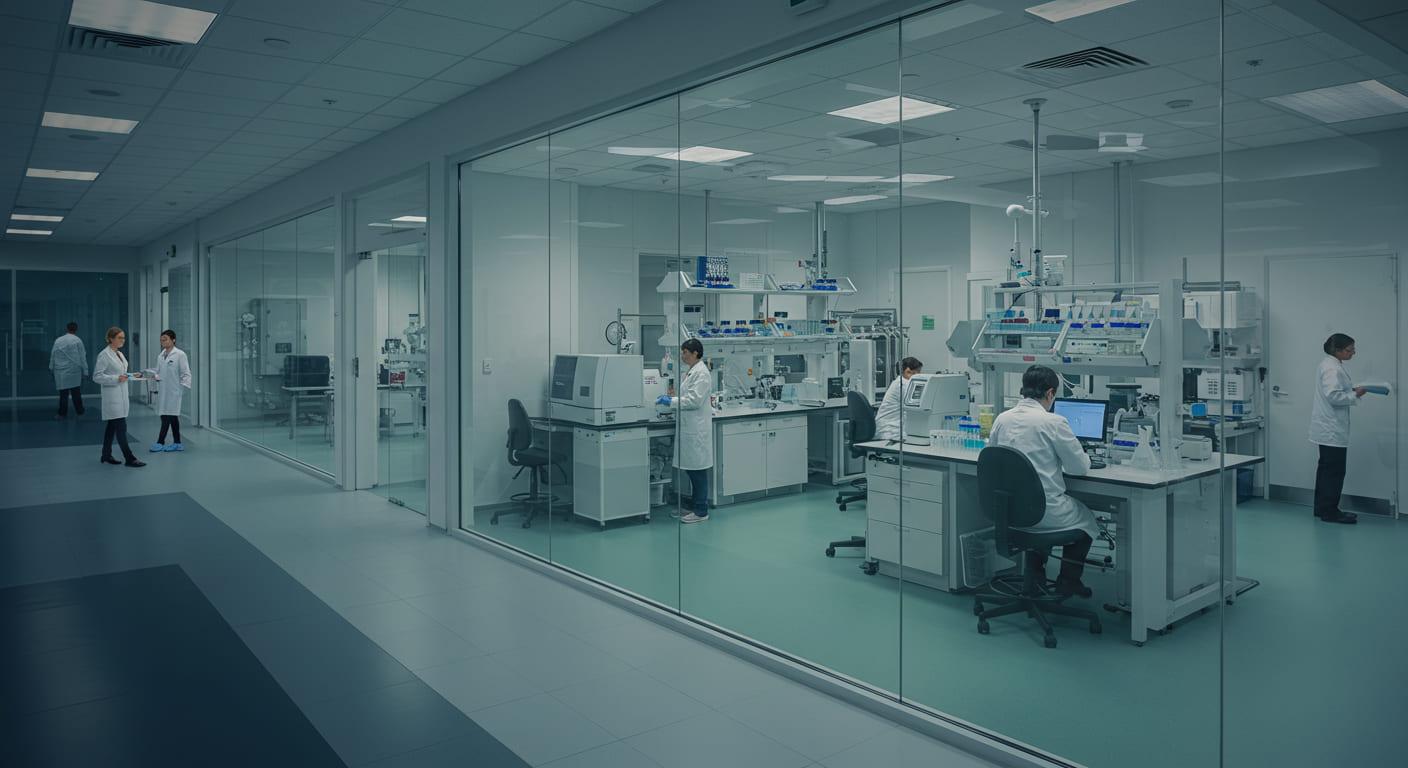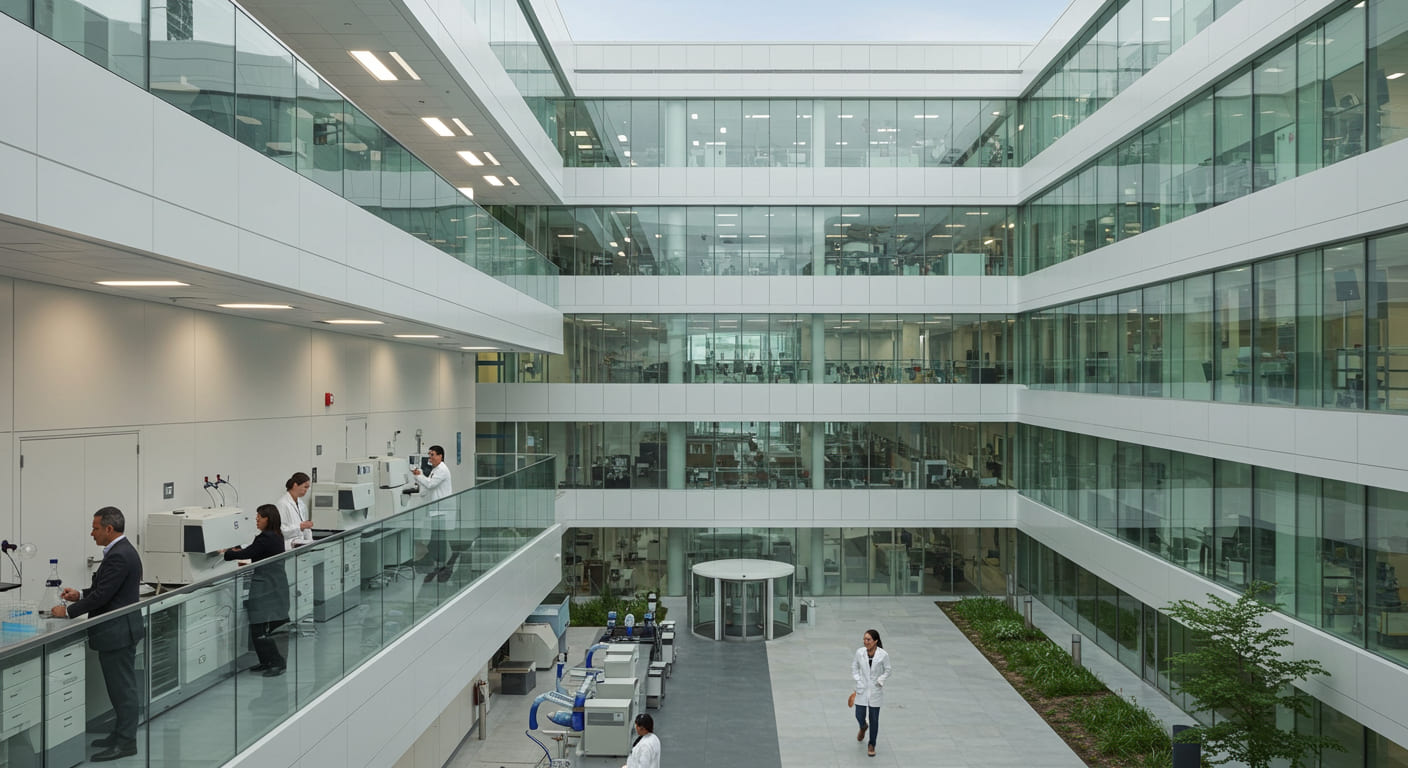Brazil offers a lucrative but complex landscape for pharmaceutical and biotechnology companies. As the largest healthcare market in Latin America and one of the top 10 pharmaceutical markets globally, Brazil’s 216+ million population presents vast business opportunities. However, succeeding in this market requires navigating Brazil’s unique regulatory environment, understanding the company formation process, complying with a multifaceted tax system, and addressing common concerns of foreign investors. This guide provides a comprehensive overview of how to open a pharmaceutical or biotech company in Brazil, covering Brazilian regulations, incorporation steps, tax obligations, investor rights, and key FAQs.
Brazilian Regulations for Pharma & Biotech Companies

Entering Brazil’s pharma/biotech sector means complying with Brazilian norms and regulatory agencies that govern healthcare products and businesses. The cornerstone of pharmaceutical regulation in Brazil is ANVISA (National Health Surveillance Agency), which functions similarly to the FDA in the US. ANVISA oversees the approval of drugs, biologics, medical devices, and the enforcement of Good Manufacturing Practices (GMP) to ensure product safety, efficacy, and quality.
Before any medicines or biotech products can be sold in Brazil, they must be registered and authorized by ANVISA. This involves submitting technical data and clinical evidence for a marketing authorization (MA) review. ANVISA’s review timelines are typically up to 120 days for priority drugs and ~365 days for standard reviews, ensuring thorough evaluation of new products. GMP certification is also mandatory for pharmaceutical manufacturing facilities, requiring strict quality control and compliance with production standards. Companies dealing with controlled substances (e.g. opioids) face additional regulations and must implement rigorous inventory and security measures under Brazilian law.
Importantly, foreign companies cannot directly register pharmaceutical products with ANVISA. Brazilian law requires that a local entity (Brazilian company or legal representative) be legally responsible for drug approvals, imports, distribution, and pharmacovigilance. In practice, this means that to bring a new drug or biotech product to Brazil, you must establish a Brazilian company or partner with a local licensed company. The Brazilian entity will hold the product licenses and ensure post-market compliance. This structure protects Brazilian consumers and aligns with the country’s regulatory sovereignty.
Beyond ANVISA, there are other norms to understand. Consumer protection laws in Brazil are robust, especially regarding healthcare access and drug pricing. Pharmaceutical companies may encounter price regulations for certain medications and must adhere to rules ensuring affordable access. Advertising and promotion of medicines are also tightly controlled by ANVISA’s marketing regulations. If your biotech work involves areas like genetics or agriculture (e.g. GMO research), additional regulators such as the National Biosafety Commission (CTNBio) may impose guidelines.
Lastly, compliance extends to Brazil’s general business laws. Brazil has strict anti-corruption laws (Clean Company Act) and companies should implement compliance programs to avoid any practices that could violate local regulations. Overall, understanding and respecting Brazilian regulations from day one is critical – non-compliance can lead to fines or business suspension. Engaging local regulatory advisors or consultants is highly recommended to help navigate ANVISA licensing and other legal hurdles.
Steps to Open a Company in Brazil (Pharma/Biotech)

Starting a business in Brazil involves multiple bureaucratic steps. The process can be more complex than in some countries, given the many layers of bureaucracy and the language barrier, but with proper planning it is manageable. Below is a step-by-step overview of how to register a pharmaceutical or biotech company in Brazil:
- Choose a Business Structure: Decide on the legal entity type for your company. The two most common structures are the Sociedade Limitada (Ltda.) – a limited liability company – and the Sociedade Anônima (S.A.) – a corporation. An Ltda is generally simpler and faster to set up, and thanks to recent legal updates it can have one or more shareholders (you can even form a single-member Ltda). An S.A. requires at least two shareholders and is subject to more complex corporate governance rules, usually chosen by larger enterprises. For most foreign pharma/biotech ventures, an Ltda (equivalent to an LLC) is the preferred option due to its flexibility and no minimum capital requirement.
- Prepare Documentation: Assemble all required documents for incorporation. This typically includes identification documents (passports) of all shareholders and directors, the company’s constitutive documents (Articles of Association or Charter), and proof of a Brazilian address for the business. If shareholders are foreign entities or individuals, they will need a Brazilian tax ID (CPF for individuals, CNPJ for companies) before incorporation. Non-resident shareholders must also appoint a Brazilian resident as their legal representative (attorney-in-fact) for the company. This representative will be empowered to receive official notices on behalf of foreign owners and ensure compliance with local obligations.
- Company Registration (Incorporation): Submit the incorporation paperwork to the appropriate Board of Trade (Junta Comercial) in the state where the company will be based. The Articles of Association (for Ltda) or Bylaws (for S.A.) must be filed and approved by the Board of Trade, which will issue an initial company registration number (NIRE). Once the company is approved at the state level, you must register for a federal tax ID (CNPJ) with the Federal Revenue (Receita Federal). Obtaining a CNPJ is essential as it officially enrolls the company in the national tax system. In parallel, you will also register with relevant state and municipal authorities – for example, State commercial registries for ICMS (VAT) and municipal offices for an operating license (alvará). Brazil requires all businesses to have a local business address (this can be a commercial office or even a virtual office in some cases). Electronic signatures are legally recognized, so much of this process can be done via digital documents, and it is even possible to complete registration remotely via power of attorney – meaning you don’t personally have to be in Brazil to open the company.
- Licenses and Permits: After basic company registration, a pharma or biotech business must obtain specialized licenses to operate legally. Chief among these is the ANVISA Operating License. Pharmaceutical manufacturers, importers, or distributors need an Autorização de Funcionamento (Authorization to Operate) from ANVISA, often referred to as AFE, which certifies the company meets health regulatory standards. You may also need a Local Sanitary License from the state or municipal health surveillance authority (Vigilância Sanitária) for your facility. If you plan to import pharmaceutical products or raw materials, you will need to register for an import/export license (RADAR) with Brazilian Customs. At this stage, if not already done, drug products must be submitted for ANVISA registration (each product needs its own approval). In summary, before your pharmaceutical company can legally operate, it must secure all required ANVISA registrations and certifications (e.g. product registrations, GMP certificates). Ensuring compliance with these requirements is crucial and should be factored into your launch timeline.
- Open a Bank Account and Finance Setup: With your company formed, you will need to open a Brazilian corporate bank account to deposit the initial capital and transact in Brazil’s currency (Real). A local bank account is mandatory for any Brazilian company. Foreign investors will also register their investment with the Central Bank’s system (SISBACEN) after bringing capital into Brazil – this is a legal requirement to allow future profit repatriation. At this point, if you haven’t already, hire a local accountant. In fact, all companies in Brazil with foreign shareholders must appoint a Brazilian accountant to maintain their books and file taxes. An accountant familiar with international business and fluent in English (or your language) is ideal, as they will handle payroll, invoicing, and the complex tax filings on your behalf.
- Post-Incorporation Compliance: Once operational, your company must comply with ongoing obligations. This includes paying taxes (federal, state, and municipal) on the required schedule, filing financial statements, and submitting any required reports to regulators. In Brazil, annual financial statements and an annual tax return are mandatory. If you manufacture or distribute pharmaceuticals, you’ll have routine inspections for GMP compliance and will need to report certain data (like pharmacovigilance reports, if applicable, and inventory of controlled substances). Trademark registration is another step to consider – protecting your brand name or product names via the Brazilian Patent and Trademark Office (INPI) can be important for doing business confidently. Essentially, after the initial setup, ensure you have legal and accounting support to manage the bureaucracy continuously, as Brazil’s business environment requires diligent administration.
The process of opening a company in Brazil can take some time – typically around 2 to 3 months (60–90 days) to complete incorporation and initial registrations. This timeline can vary depending on the state and the efficiency of document preparation (notably, having all foreign documents apostilled and translated to Portuguese where required will speed things up). While Brazil has been modernizing its systems to reduce red tape, patience and careful attention to detail are necessary. Many foreign entrepreneurs choose to work with specialized firms to handle the incorporation and licensing process, allowing them to focus on strategic planning while local experts manage the paperwork.
Watch this video to understand how accounting handles import and export:
Tax Obligations and Incentives in Brazil

One of the biggest challenges for any new business in Brazil is understanding the taxation system, which is known to be one of the most complex in the world. Pharmaceutical and biotech companies are subject to the same general taxes as other businesses, with a few industry-specific considerations. Here are the key taxes and fiscal responsibilities to be aware of:
- Corporate Income Taxes: Brazil’s corporate income tax rate is effectively about 34% on profits. This rate comprises two parts: IRPJ (Corporate Income Tax) at 15% (plus a surcharge on high profits) and CSLL (Social Contribution on Net Profit) at 9%, which together yield roughly 34%. Companies can be taxed on an actual profit basis (Lucro Real) or a presumed profit basis (Lucro Presumido) if they qualify (usually smaller companies under certain revenue thresholds). Many large or regulated companies (including those in pharma) opt for Lucro Real due to strict accounting of costs and revenues. Importantly, Brazil historically does not tax dividends distributed to shareholders – dividends have been exempt from withholding tax for decades. This means profits after the 34% corporate tax can typically be paid out abroad without an additional tax, making repatriation relatively efficient. (Note: Tax reform proposals are under debate to tax dividends in the future, but as of now dividends remain exempt.)
- Indirect Taxes (VAT and Sales Taxes): When operating in Brazil, you’ll encounter multiple layers of sales and value-added taxes. The primary one is ICMS (Imposto sobre Circulação de Mercadorias e Serviços), a state-level VAT on goods and some services. ICMS rates vary by state and product, but average around 17–20% (commonly 18% in many states). Pharmaceutical products in Brazil may have special ICMS treatments – for example, some essential medicines enjoy tax exemptions or reduced rates as part of public health policy, but others are taxed normally. Additionally, the federal government imposes PIS/COFINS on gross revenues, which function like a federal VAT. The standard combined PIS+COFINS rate is 9.25% on revenues (in the non-cumulative regime), though certain pharmaceutical products might be zero-rated or subject to alternative calculations depending on government programs. If your company provides services (e.g. R&D services, consulting), the municipal ISS (Service Tax) will apply, usually between 2% and 5%, depending on the city.
- Labor Taxes and Social Contributions: Hiring employees in Brazil comes with significant payroll costs. Employers must contribute about 20% of salaries to social security (INSS), plus deposits into a severance fund (FGTS) and other labor-related taxes. While not a tax per se, Brazil’s labor laws mandate benefits like year-end bonuses and paid vacations that effectively increase employment costs. It’s crucial to budget for these contributions if you plan to have local staff.
- Industry-Specific Taxes: Pharmaceuticals may be subject to IPI (Imposto sobre Produtos Industrializados), a federal excise tax on manufactured goods. Certain pharmaceutical categories are exempt from IPI to encourage lower medicine prices or local production. For example, under the government’s programs, many medicines for domestic consumption have a 0% IPI rate, but it can vary. Also, if you import pharmaceutical ingredients or products, you will pay import duties and likely II (Import Tax) and other customs fees. Brazil has a system called “Carga Tributária” that sums up all taxes on a given product – for many medicines, the combined tax burden can be significant unless reduced by specific incentives.
Despite the heavy taxes, Brazil does offer incentives to encourage investment and innovation, particularly in biotech and pharma. One major incentive program is the “Lei do Bem” (Law of Good), which provides generous tax benefits for companies engaging in Research & Development. Under Lei do Bem, a company can deduct up to 34% of eligible R&D expenditures from its taxable income (essentially an income tax reduction). Additionally, purchases of machinery and equipment for R&D can be exempt from IPI and even enjoy accelerated depreciation for tax purposes. These incentives are designed to lower the effective tax rate for innovative pharma/biotech firms and stimulate local innovation.
Furthermore, depending on your location in Brazil, state and local governments may offer tax breaks or credits. Some states create industry clusters or free trade zones (for instance, Manaus Free Zone) where businesses get ICMS or ISS tax abatements. Performing a tax planning analysis is highly recommended, as choosing the right state to base your operations or manufacturing can make a difference – for example, São Paulo and Rio de Janeiro are popular for corporate offices, but other states might offer better tax conditions for production. Engaging a tax consultant or accounting firm (like CLM Controller) early on will help you maximize any available benefits and ensure compliance with all reporting requirements.
In summary, Brazil’s tax regime for pharma/biotech companies involves high but manageable taxes. By understanding your obligations (corporate tax, ICMS, PIS/COFINS, etc.) and leveraging incentives (R&D credits, regional programs), you can plan for profitability while staying compliant. Always keep in mind that Brazilian tax laws change frequently – staying updated or having local experts monitor changes is essential for long-term success.
Foreign Investment Rights and Other Considerations

Entrepreneurs from abroad often have questions about their rights and the general business environment in Brazil. The good news is that Brazil is open to foreign investment, and foreign individuals or companies enjoy largely the same rights as local Brazilian businesses in most sectors. Here are some key considerations and common doubts addressed:
- 100% Foreign Ownership: You do not need a Brazilian partner or shareholder to open a company in Brazil. Full foreign ownership is allowed in the pharmaceutical and biotech industries. Brazil imposes ownership restrictions only in a few sensitive sectors (like media, nuclear energy, postal services, and certain healthcare services such as healthcare providers). Manufacturing or researching pharmaceuticals is not restricted, and global pharma companies routinely operate wholly-owned subsidiaries in Brazil. This means you can maintain complete control of your Brazilian operation, with no legal requirement to cede equity to a local entity.
- Repatriation of Profits and Capital: Brazil allows foreign investors to freely remit profits abroad (after paying the applicable Brazilian taxes). As noted, dividends can be sent to foreign parents without withholding tax. You can also repatriate your invested capital. The key is to properly register all foreign capital inflows with the Central Bank’s system when you invest; this registration (RDE-IED) ensures that future outbound transfers of profits or dividends are smooth and in the correct amount. Currency exchange controls in Brazil have been liberalized in recent years – while currency transactions must be done through authorized banks, there is generally no barrier to sending money out as long as taxes are in order.
- Legal Protection and Stability: Brazil’s legal system provides a stable framework for business rights. Shareholders (including foreigners) have their rights protected by Brazilian corporate law. In fact, a recent reform called the Economic Freedom Law strengthened protections for business owners by limiting arbitrary government interference and improving the limited liability shield for shareholders. Contracts are enforceable in Brazilian courts, and Brazil is a member of international conventions that uphold arbitration and intellectual property rights. Foreign investors can own property (offices, factories) in Brazil, and can also participate in public bids and incentives programs on equal footing, except for a few areas of national security.
- Intellectual Property (IP) and Patents: Pharmaceutical and biotech companies should plan to secure their IP in Brazil. Patents for pharmaceuticals are recognized (20-year terms from filing, similar to international standards), and Brazil is part of the Paris Convention and TRIPS agreement, meaning your innovations can be protected. However, patent examination in Brazil can be slow, so it’s wise to file early. Trademarks are also important – registering your company name, product names, or any brand is recommended to prevent others from using them. IP enforcement is handled by Brazilian courts; while the process can be lengthy, legal remedies (injunctions, damages) are available for infringement. Ensure you budget for IP strategy as part of market entry if you have proprietary technology or drug formulas.
- Labor and Employment Law: Brazil has relatively strong labor laws that grant employees many rights. As an employer, be prepared to comply with the Consolidation of Labor Laws (CLT) which mandates benefits like paid vacations, a “13th month” salary bonus, overtime pay, and strict rules on dismissal and severance. It’s important to understand these obligations to maintain good HR practices and avoid labor disputes. Many foreign companies are initially surprised by the level of worker protections in Brazil, so consulting with a local HR expert or labor lawyer can help in designing employment contracts and workplace policies.
- Cultural and Language Factors: While not a “right” per se, foreign entrepreneurs should consider the language and cultural context. Portuguese is the official language, and most legal proceedings and documentation must be in Portuguese. Having bilingual staff or advisors is crucial so you can bridge any communication gaps. Brazilian business culture values personal relationships and trust – networking and patience go a long way. Also, everyday bureaucracy may feel slow or paperwork-heavy; understanding that this is normal in Brazil will help set the right expectations. On the flip side, Brazilians are very
welcoming to foreign businesses, and you’ll find a talented workforce and capable service providers ready to collaborate if you show commitment to the local market.
Overall, Brazil grants foreign pharma and biotech investors robust rights to operate and profit, along with a stable legal environment to grow your business. The challenges mainly lie in compliance – following the rules, respecting the regulatory agencies, and adapting to local ways of doing business. By being informed and well-advised, you can turn Brazil’s challenges into opportunities, tapping into a huge market that continues to grow in healthcare demand.
CLM Controller: Supporting Your Business Launch in Brazil

Successfully establishing a pharmaceutical or biotech company in Brazil requires expert guidance across legal, accounting, and regulatory domains. This is where CLM Controller can make a difference. CLM Controller is a Brazilian consulting and accounting firm with over 40 years of experience helping international businesses navigate Brazil’s complex environment. We specialize in providing end-to-end support for foreign entrepreneurs – from opening your company swiftly and handling all the bureaucratic registrations, to ongoing tax compliance, accounting, and payroll management.
A key advantage of working with CLM Controller is our multilingual team and personalized service. We understand that language can be a barrier, so we assign you a dedicated bilingual account manager who communicates with you in your native language and truly embraces your corporate culture. This ensures clear understanding and efficient handling of your requirements. While you focus on your core business or the science behind your products, CLM takes care of the back-office and regulatory tasks – whether it’s determining the best tax regime for your company, obtaining necessary permits, or keeping your books in order. Our goal is to make your market entry and operations in Brazil as smooth as possible, improving the delivery of all your business demands through local expertise and tailored solutions.
Entering a new market is always challenging, but you don’t have to do it alone. With CLM Controller’s comprehensive services and commitment to client success, you gain a reliable partner to navigate Brazilian laws, taxes, and norms with confidence. We bridge the gap between your home country practices and Brazil’s specifics, giving you peace of mind that everything is done by the book. From the first step of company formation to the ongoing growth of your pharmaceutical or biotech venture in Brazil, CLM is here to support you every step of the way.
FAQ – Frequently Asked Questions

- Can a foreigner fully own a pharmaceutical or biotech company in Brazil?
Yes. Brazil permits 100% foreign ownership of companies in the pharma/biotech sector. You do not need a Brazilian partner or investor by law. Foreign individuals or corporations can be the sole shareholders of a Brazilian company. The only requirements are appointing a local legal representative (a Brazilian resident) for the company’s shareholders and following the standard incorporation process. Aside from a few restricted industries (like media or nuclear energy), Brazil’s economy is very open to foreign investment, and pharma/biotech is no exception. Many multinational pharmaceutical companies operate subsidiaries in Brazil that are entirely foreign-owned. Keep in mind, while you can own the company outright, you must still register your foreign investment with the Central Bank and comply with local laws, but ownership control remains with you. - What are the requirements and steps to open a pharma company in Brazil?
To open a pharmaceutical (or biotech) company in Brazil, you’ll need to go through the incorporation process and then obtain industry-specific licenses. First, decide on your company structure – most choose a Limitada (Ltda.) for its simplicity. Next, gather required documents: passports/IDs of owners, proof of address, and draft the company’s Articles of Association. If you are not residing in Brazil, ensure you have a Brazilian CPF (individual tax ID) for each foreign shareholder or director, and appoint a Brazilian resident as an attorney-in-fact for service of process. Then, register the company with the Board of Trade (Junta Comercial) in the state you choose – this creates your company legally. After state approval, register for a CNPJ with the federal tax authorities. You’ll also open a Brazilian bank account for the company to fund it. Once the company is formed, proceed with ANVISA registration: apply for an operating license from ANVISA (AFE), register any pharmaceutical products you plan to handle, and secure GMP certification if you will manufacture products. Don’t forget local operational permits like municipal licenses and enrolling with tax authorities at state (for ICMS) and city (for ISS) levels. The overall process takes approximately 2–3 months in total to get fully set up, assuming all paperwork is in order. Working with a local consultant or firm can greatly simplify these steps and ensure nothing is missed. - What licenses or permits does a pharmaceutical company need in Brazil?
Pharmaceutical companies in Brazil need several key licenses/permits to operate legally:
- ANVISA Operating Authorization (AFE): This is a must-have license from Brazil’s National Health Surveillance Agency (ANVISA) allowing your company to operate in the health products sector. Different categories exist (for manufacturers, distributors, importers), but generally an AFE certifies your facility and processes meet health regulations.
- Product Registrations: Every medication or therapeutic product you intend to sell in Brazil must be approved and registered with ANVISA before commercialization. The registration process requires submitting detailed dossiers demonstrating the product’s safety, efficacy, and quality. Once approved, marketing authorizations are typically valid for 5 or 10 years and can be renewed.
- GMP Certification: If you will manufacture locally, your plant needs to comply with Good Manufacturing Practices (GMP). ANVISA will inspect and certify the facility for GMP, which covers quality control, documentation, and manufacturing processes. This certification is often a prerequisite to obtain or maintain the product registrations.
- Local Operating Permits: These include a municipal business license (alvará de funcionamento) for your office or factory, and a ** sanitary permit** from the local health surveillance (Visa) authority which often inspects pharmacies, laboratories, or factories for hygiene and safety.
- Import/Export License: If you plan on importing pharmaceutical ingredients or products, you’ll register with the federal customs system (known as RADAR license) to obtain the ability to import. Exporting pharmaceutical goods also requires proper licensing and compliance with health authority notifications.
- Professional Responsibility Registrations: Pharma companies typically need a responsible pharmacist (or similar qualified professional) on staff registered with the Regional Pharmacy Council, to take technical responsibility for the handling of drugs. This is a legal requirement for businesses dealing with medications.
Aside from these, ensure your company is registered with all tax authorities (federal, state, municipal) and any relevant industry bodies. For biotech firms, if working with certain sensitive materials (like human blood products, radioisotopes, or genetic engineering), additional authorizations from agencies like the Ministry of Health or CTNBio might be required. Always verify the specific licenses for your exact line of business – for example, a company focusing on diagnostic devices would need ANVISA clearances for medical devices instead of drugs. Compliance is multifaceted, but obtaining the ANVISA operational license and product approvals are the central steps for any pharma company entering Brazil.
- What taxes will my pharmaceutical/biotech company need to pay in Brazil?
A pharma or biotech company in Brazil will be subject to several layers of taxes:
- Corporate Income Tax: ~34% on taxable profits. This is composed of the corporate income tax (IRPJ) and a social contribution (CSLL). It’s usually calculated quarterly or annually depending on your tax regime (actual profit vs. presumed profit).
- Dividends Withholding: 0% (currently). Brazil does not tax dividends paid to shareholders under current law. This means after paying the corporate taxes, profit distributions can be made without additional Brazilian withholding tax (note: your home country might tax the dividends).
- Sales/Indirect Taxes: ICMS, a state-level VAT, typically 18% on sales of goods (including medications). Some medicine categories might have exemptions or lower rates, particularly if they are on government essential drug lists. Also PIS/COFINS, federal taxes on gross revenue (~9.25% combined in the standard regime) will apply to sales of products. If your company provides services (like a laboratory service), the ISS municipal service tax (around 2-5%) will apply instead of ICMS.
- Payroll Taxes: Around 28-30% on top of salaries in social security, unemployment fund, and other labor-related contributions. This affects your cost of hiring employees rather than profits, but it’s a significant statutory expense.
- Other Taxes: If you import equipment or ingredients, Import Duty (II) will apply (rates vary by item), plus import PIS/COFINS and ICMS on imports. There’s also IPI, a federal excise tax, but many pharmaceutical products are exempt from IPI or have reduced rates to encourage affordability or local production. For example, medicines on the government’s essential list often have 0% IPI.
Brazil’s tax system is notably complex, so your company will need good accounting support to calculate and file all these taxes correctly. The system also offers incentives: as mentioned, the Lei do Bem can effectively reduce your income tax if you invest in R&D, and some states offer tax credits or financing for pharma investments. Be sure to consult with a Brazilian tax expert to optimize your tax position — for instance, structuring your operations to take advantage of any local tax breaks, and ensuring you recover any tax credits (like VAT credits on inputs). Compliance with tax filing deadlines (monthly, quarterly, annually for various taxes) is crucial to avoid penalties. In short, expect to pay corporate taxes on profits, VAT on sales, and various payroll and transactional taxes as part of doing business in Brazil’s pharmaceutical industry, but also explore special regimes or incentives that might apply to your company to mitigate the overall tax burden.
- Are there incentives or support programs for biotech and pharma companies in Brazil?
Yes. The Brazilian government has several incentives and support programs aimed at stimulating the pharmaceutical and biotechnology industries:
- R&D Tax Incentives (Lei do Bem): As described earlier, the Lei do Bem (Law of Good) is a major incentive allowing companies engaged in research and innovation to deduct a significant percentage of R&D expenses from taxable income. Pharma and biotech firms developing new drugs, therapies, or technologies can benefit by reducing up to ~34% of those R&D costs from their income tax, getting IPI tax exemptions on equipment used for R&D, and payroll tax deductions for research personnel. This effectively lowers the cost of innovating in Brazil.
- Government Procurement Programs: Brazil’s public healthcare system (SUS) is a huge purchaser of medicines. The government encourages local production through programs like Productive Development Partnerships (PDP). A PDP allows a foreign pharma company to partner with a Brazilian public lab or local manufacturer to supply the government with a strategic product. In return, the foreign company transfers technology to Brazil over time. These partnerships can give you guaranteed large-volume purchases by the government in the short term, though they require commitment to localizing production in the long run.
- State-Level Incentives: Certain states offer tax abatements or financial incentives for companies setting up manufacturing plants or research centers. For example, some states may reduce or defer ICMS (VAT) for a period, or offer cheap land in industrial parks. State development agencies (like São Paulo’s Desenvolve SP or others) sometimes provide low-interest loans or grants for biotech startups.
- Innovation and Investment Funding: There are government-affiliated agencies such as FINEP and BNDES that provide financing for innovation. FINEP (Funding Authority for Studies and Projects) offers grants or soft loans for technological innovation projects in biotech/pharma. BNDES (National Development Bank) has credit lines for health industry investments. Additionally, the EMBRAPII program connects companies with research institutions and shares the cost of R&D projects.
- Incubators and Tech Parks: Brazil has a growing network of biotech incubators and technology parks (for instance, in the state of Minas Gerais or São Paulo) that offer startups support, tax breaks, and proximity to universities. Joining an incubator can sometimes give temporary tax relief and access to laboratories and expertise at lower cost.
In summary, Brazil is actively trying to attract and grow the life sciences sector, so taking advantage of these incentives can greatly benefit your venture. It’s advisable to work with local consultants who can identify specific programs that match your company’s profile. Whether it’s cutting your tax bill via R&D credits, securing a big contract through a PDP, or getting subsidized loans for a new factory, these supports can improve your business case for operating in Brazil. Always verify the current rules and application processes, as incentive programs can be subject to annual budgets and policy changes.







0 Comments